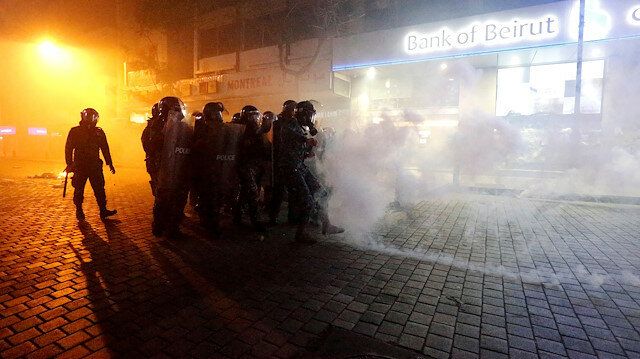Clashes between security forces and protesters erupted late Tuesday into early Wednesday, a day after Lebanese protesters spilled back into the streets following a brief lull in the three-months-long movement.
Lebanese protesters returned to the streets on Tuesday, in what they said would be a “week of anger” calling an end to the ongoing political vacuum.
Earlier Tuesday, hundreds of protesters brought traffic to a standstill as they blocked Beirut’s Ring Bridge and major highways connecting across Lebanon with burning tires and overturned dumpster bins.
Similarly, in the northern city of Tripoli, protesters sat in the streets, with flaming tires halting any movement on other major highways. In the southern port city of Saida, protesters marched down blocked roads, while some gathered outside banks and government offices.
Security forces clashed with dozens of protesters gathered outside Central Bank in Hamra, demanding access to their deposits and chanting against the governor and his financial policies.
Tensions quickly escalated when several protesters snuck into Central Bank’s yard. Riot police fired a large amount of tear gas to disperse those in Hamra, while dozens of protesters threw stones and fireworks at security forces, who called on protesters to leave the area “for their safety or else they will be deemed rioters and chased.”
Multiple protesters also smashed bank windows and ATMs, expressing their frustration at the worsening economic crisis and informal capital control procedures.
Around 50 protesters were detained on Tuesday, according to multiple accounts on the ground. Demonstrators quickly rushed to different police stations across Beirut, demanding their immediate release. Several were released overnight, and others remain in custody.
UPDATE: Nour Chamseddine, another protester, being arrested at Ring Bridge.
Video via @nmoawad pic.twitter.com/Q5T3u4J78Z
— Beirut Today (@bey_today) January 14, 2020
Riot police also prevented journalists from approaching those arrested, with Al-Jadeed reporter Ramez El Kadi pushing through and asking multiple protesters being detained to yell out their names on live television so “their parents can know.”
Combining journalism & human rights – @ramezelkadi from @ALJADEEDNEWS is making sure to document on live Tv every single arrest made by riot police tonight in #Beirut – urging the protestor to shout his name out loud as he is being arrested. #Lebanon #lebanonprotest pic.twitter.com/iYp6GzTjPh
— Luna Safwan – لونا صفوان (@LunaSafwan) January 14, 2020
Despite a relative calm in recent weeks, renewed rallies against the political elite come as President Michel Aoun said on Tuesday that “obstacles” had prevented the formation of the new government, which was expected last week.
In a televised speech, Aoun said, “Although we do not have the luxury of delay, the formation of the government requires the selection of qualified candidates worthy of the confidence of both the people and parliament, which, in turn, requires time.”
Following the December designation of Hassan Diab as Lebanon’s new prime minister, division among rival political parties have prevented the formation of an emergency government.
Angered by politicians and their inability to listen to the people’s demands and form a new government, one protester in Beirut said, “I just don’t understand why they don’t listen to our demands… they need to wake up and look outside.”
Lebanon is facing its worst economic crisis in decades, with local currency plummeting before the dollar and losing more than 60 percent of its value in recent weeks. The cost of living continues to rise, and many Lebanese have either lost their jobs or have seen their salaries slashed in half.
Aoun provided little reassurance when he said Lebanon was currently paying the price for 30 years of wrong financial policies.
Although protests have been ongoing since October, demonstrations have been increasingly targeting banks and state institutions blamed for plunging the country’s economic crisis. Protesters have also taunted politicians and at times chased them out of public areas while decrying their failure in addressing the spiraling economic crisis.
One protester in Tripoli told local broadcast LCB that the situation has become “unbearable,” adding that, “Prices are exorbitant, yet still they’re taking their sweet time to form a new government.”


